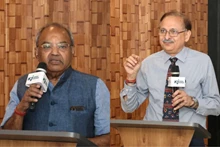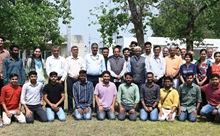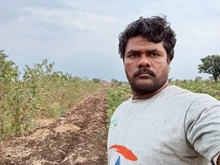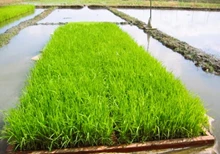
World Soil Day is celebrated every year on 5th December to spread awareness about the importance of healthy soil and to advocate for the sustainable management of the soil resource.
In order to celebrate the same, Krishi Jagran organized a webinar on “Significance of Controlling Soil Salinity” on 5th December 2021. Various dignitaries from across the industry shared their thoughts on the same.
One of the key speakers was Dr. AK Nayak, Principal Scientist, and Head, Crop Production Division (ICAR), National Rice Research Institute, Cuttack (Odisha). Dr. Nayak said, “FAO identified 9 types of dangers to soil health, and soil-Salinization is one of them. Farmers should first handily get proper soil examination. Soil salinity is classified into different types like – saline soil, saline-sodic soil (contains high pH and low saline concentration), sodic soil (ESP is more than 15 and saline concentration is lower than 4 decimeter inverse), each having its own ways of management. This also applies to light texture soil, but the measurements vary for fine-textured soil, for example – black soil having more than 6 ESP also comes under sodic soil. After knowing all these specifications only the soil management can be done properly. The main reason behind soil salinization is due to geological soil formation and weathering, capillary rise in groundwater, and with it comes the salts, which are left in the soil after evaporation, change in land use pattern, anthropogenic intervention. 6.3 million Ha”.
He added that “Soil in India is salt-affected soil, under which more than 3 million Ha is sodic soil, including the coastal saline soil (which is 7,000 km), and the rest is considered as in-land saline soil. Saltwater intrusion affects the coastal soil due to which salinity increases. Not only it affects soil productivity but is also harmful to the environment, ecosystem, and human health. Different crops like rice, barley, potato, sugar beet have less tolerance to different. Global estimates say, there is a loss of $27 billion p. a. due to soil salinization. 2012-14 data shows that India losses 6 million tons of farm production and 230 billion rupees every year, because of soil salinization. Biodiversity is also affected as many flora and fauna species have become extinct due to soil salinity. There is a 50% decline in water parks and many microorganisms present in the soil are also affected. Electrical conductivity (EC), leaching fraction, root zone salinity measurement, etc are different ways to measure soil salinity”.
He further told that – “modern technologies like - Aerial photography, land-sat and thematic mapping, etc are used for soil monitoring and soil can be restored through different remedial techniques. Soil reclamation through bio-engineering and agro-hydro methods, etc can be done, like coastal embankments and tidal regulator installation can reduce saline intrusion.”
About Dr. Nayak
Dr. Nayak has done a Ph.D. (Soil fertility/Chemistry/Microbiology)
Post Doctoral Research Experience/Training: Fellow of Indo-US Norman E. Borlaug International Agricultural Science and Technology: Completed fellowship Training at Agricultural Biosystem Engineering Department IOWA State University, the USA on Water Management from 10 October to 22 November 2008. Visiting scientist on Salinity Control to Soil Water Environment Research Institute, Cairo, Egypt from 31 August to 14 September 2008. Training on “Cropping system models- Application in Land Resource Management at Hyderabad organized by ICRISAT, Patancheru, Hyderabad and the University of Florida. Computer Models in Irrigation at ANGARAU, Hyderabad organized by ILRI, The Netherlands & ANGRAU, and Hyderabad.
Awards/Honors: Borlaug Fellow 2008 for water quality management and visited Iowa State University, the USA for completion of the fellowship. BHU Gold Medal in M.Sc (Ag) in Soil Science and Agricultural Chemistry in 1993.












